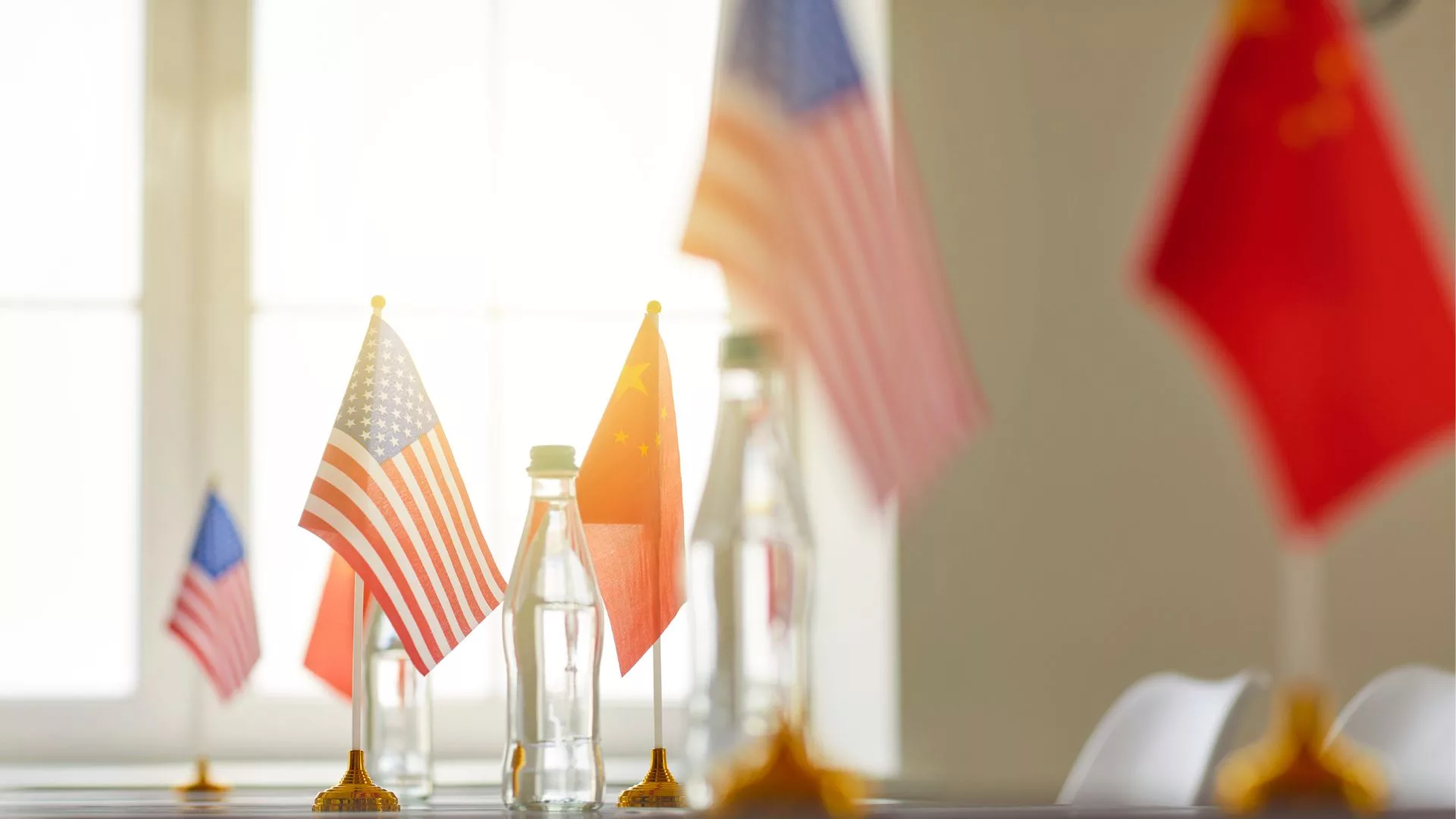In a recent webinar hosted by the Brookings Institution titled “A conversation with US Ambassador to China R. Nicholas Burns on US-China relations” Ambassador Burns provided insights into the complex dynamics between the United States and China, shedding light on key takeaways that bear significance in today’s geopolitical landscape.
One of the central concerns discussed during the webinar was the deepening strategic alignment between China and Russia. Ambassador Burns pointed out that this alignment has raised considerable concerns, particularly in the context of the ongoing conflict in Ukraine. While China has not provided lethal military assistance to Moscow, bilateral trade between China and Russia has been flourishing, and both nations continue to engage in joint military exercises, including recent joint patrols over the Sea of Japan and the East China Sea. The United States is closely monitoring this alignment and its potential implications for global stability.
The U.S. government has taken a clear stance on China’s role in the Ukraine conflict. Ambassador Burns emphasized that Secretary of State Antony Blinken publicly called on China not to provide lethal military assistance to Russia for the war in Ukraine. In response to any deviation from UN sanctions, the U.S. has imposed sanctions on Chinese companies, underscoring its commitment to holding China accountable for its actions.
Despite China’s claims of neutrality in the Ukraine conflict, Ambassador Burns highlighted that there is a perceived tilt towards Russia in its approach. He cited instances where Ukraine’s leading trade partner, pre-war, was China. However, China’s stance in international political meetings and the United Nations has appeared neutral. Still, the Chinese state-controlled media has blamed the conflict on the United States and NATO from the outset. This discrepancy underscores substantial differences between the U.S. and China regarding the Ukraine conflict.
Another crucial aspect of the discussion was the situation in Taiwan. Ambassador Burns emphasized the importance of a peaceful resolution to cross-strait differences and maintaining the status quo. He noted that President Biden has reiterated the longstanding American policy that aims for a peaceful resolution of disputes concerning Taiwan. The hope is that the upcoming Taiwan elections will be free from intimidation, coercion, or interference, allowing the island nation to continue its democratic process independently.
Scientific collaboration between the U.S. and China also came under scrutiny. Ambassador Burns acknowledged the value of reciprocity in such collaborations, citing the need to modernize agreements that date back to 1979. He explained that discussions are ongoing to address the evolving landscape of scientific and technological advancements, with an emphasis on ensuring fairness and equitable participation from both sides.
The webinar also delved into the limitations of policy debate within China. Ambassador Burns recognized that China’s authoritarian system and centralized power have led to limited diversity of views, particularly in state-controlled media. He highlighted the importance of providing an accurate view of American society and policy to the Chinese people, countering any distortions or misconceptions that may arise.
In conclusion, Ambassador Burns stressed the need for person-to-person engagement between the U.S. and China, particularly involving young people and students. He underscored the significance of restoring direct flights between the two countries, making it more accessible for people to engage and fostering mutual understanding.
Additionally, Ambassador Burns highlighted the strengthening of strategic ties with India, emphasizing the importance of democratic countries coming together in the Indo-Pacific region. He mentioned that India plays a pivotal role in maintaining open sea lanes and freedom of navigation, contributing to global stability.
The insights shared by Ambassador Burns in this webinar shed light on the intricate web of U.S.-China relations, emphasizing the importance of diplomacy, strategic partnerships, and promoting mutual understanding in today’s interconnected world. These considerations continue to shape the evolving landscape of international relations and global security.
- Asia Scotland Institute
- Asia Scotland Institute
- Asia Scotland Institute
- Asia Scotland Institute
- Asia Scotland Institute
- Asia Scotland Institute
- Asia Scotland Institute
- Asia Scotland Institute
- Asia Scotland Institute
- Asia Scotland Institute
- Asia Scotland Institute
- Asia Scotland Institute
- Asia Scotland Institute
- Asia Scotland Institute
- Asia Scotland Institute
- Asia Scotland Institute
- Asia Scotland Institute
- Asia Scotland Institute
- Asia Scotland Institute
- Asia Scotland Institute
- Asia Scotland Institute
- Asia Scotland Institute
- Asia Scotland Institute
- Asia Scotland Institute
- Asia Scotland Institute
- Asia Scotland Institute
- Asia Scotland Institute
- Asia Scotland Institute
- Asia Scotland Institute
- Asia Scotland Institute
- Asia Scotland Institute
- Asia Scotland Institute
- Asia Scotland Institute
- Asia Scotland Institute
- Asia Scotland Institute
- Asia Scotland Institute
- Asia Scotland Institute
- Asia Scotland Institute
- Asia Scotland Institute
- Asia Scotland Institute
- Asia Scotland Institute
- Asia Scotland Institute
- Asia Scotland Institute
- Asia Scotland Institute
- Asia Scotland Institute
- Asia Scotland Institute
- Asia Scotland Institute
- Asia Scotland Institute
- Asia Scotland Institute
- Asia Scotland Institute
- Asia Scotland Institute
- Asia Scotland Institute
- Asia Scotland Institute
- Asia Scotland Institute
- Asia Scotland Institute
- Asia Scotland Institute
- Asia Scotland Institute
- Asia Scotland Institute
- Asia Scotland Institute
- Asia Scotland Institute
- Asia Scotland Institute
- Asia Scotland Institute
- Asia Scotland Institute
- Asia Scotland Institute
- Asia Scotland Institute
- Asia Scotland Institute
- Asia Scotland Institute
- Asia Scotland Institute
- Asia Scotland Institute
- Asia Scotland Institute
- Asia Scotland Institute
- Asia Scotland Institute
- Asia Scotland Institute
- Asia Scotland Institute
- Asia Scotland Institute
- Asia Scotland Institute
- Asia Scotland Institute
- Asia Scotland Institute
- Asia Scotland Institute
- Asia Scotland Institute
- Asia Scotland Institute
- Asia Scotland Institute
- Asia Scotland Institute
- Asia Scotland Institute
- Asia Scotland Institute
- Asia Scotland Institute
- Asia Scotland Institute
- Asia Scotland Institute
- Asia Scotland Institute
- Asia Scotland Institute
- Asia Scotland Institute
- Asia Scotland Institute
- Asia Scotland Institute
- Asia Scotland Institute
- Asia Scotland Institute
- Asia Scotland Institute
- Asia Scotland Institute
- Asia Scotland Institute
- Asia Scotland Institute
- Asia Scotland Institute
- Asia Scotland Institute
- Asia Scotland Institute
- Asia Scotland Institute
- Asia Scotland Institute
- Asia Scotland Institute
- Asia Scotland Institute
- Asia Scotland Institute
- Asia Scotland Institute
- Asia Scotland Institute
- Asia Scotland Institute
- Asia Scotland Institute
- Asia Scotland Institute
- Asia Scotland Institute
- Asia Scotland Institute
- Asia Scotland Institute
- Asia Scotland Institute
- Asia Scotland Institute
- Asia Scotland Institute
- Asia Scotland Institute
- Asia Scotland Institute
- Asia Scotland Institute
- Asia Scotland Institute
- Asia Scotland Institute
- Asia Scotland Institute
- Asia Scotland Institute
- Asia Scotland Institute
- Asia Scotland Institute
- Asia Scotland Institute







